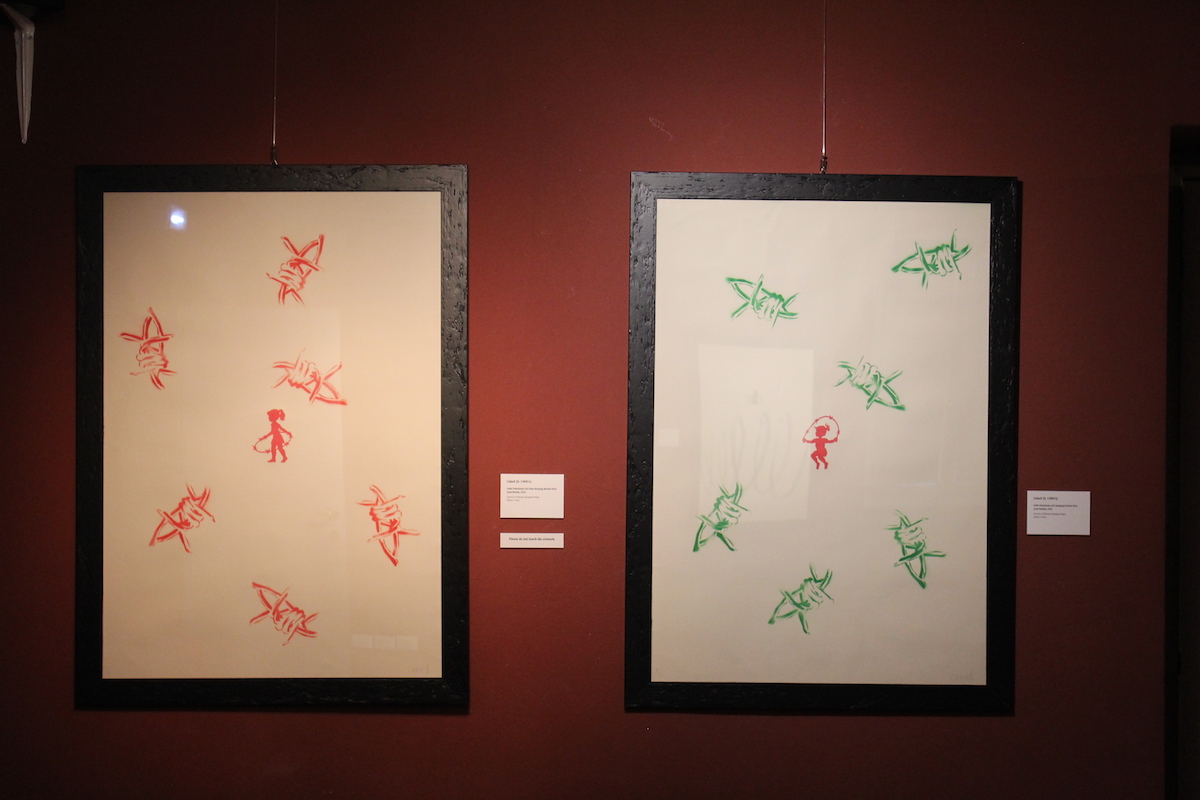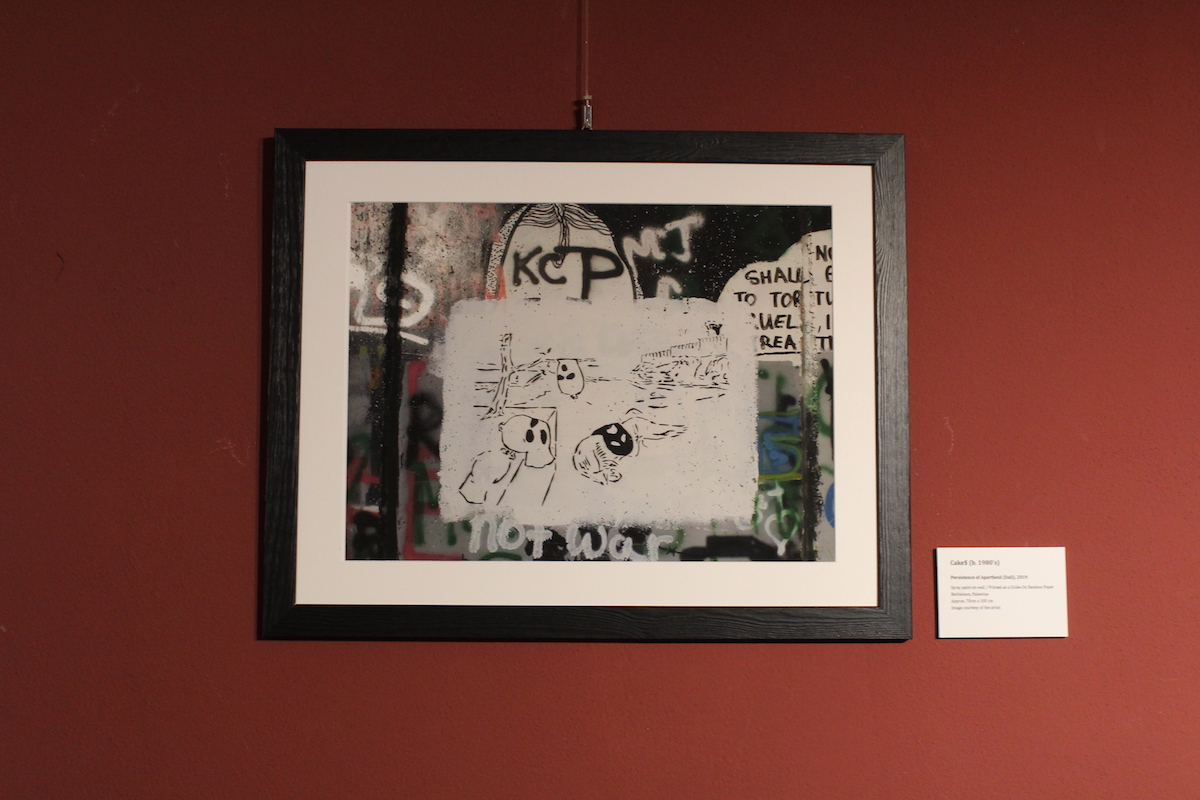Life Style: Anwar Hadid and Vin Arfuso’s ‘Walled Off’ premieres in Italy

From West Bank ‘apartheid wall’ to gallery walls in Italy: Cake$’s activist art goes on show
The work of European street artist and activist Cake$, who uses public art to protest against Israel’s separation barrier in the West Bank and as an expression of solidarity with the Palestinian people, is currently on display for the first time in Italy.
The exhibition, titled A Child Is Born In Bethlehem, opened at the Palazzo Oddo Gallery in Albenga on Sep. 4 and continues until Sep. 19. Curated by British-Palestinian art collector, activist and journalist Zayna Al-Saleh and Italian collector Lorenzo Sibilla, it showcases the entirety of the artist’s work to date, including photography of his street art in Palestine, original stencils, linocuts and video art.
Cake$, who guards his true identity and describes himself on his Instagram page as an “open-air prison artist,” has created more than 300 works in Bethlehem over the past four years.
The title of the exhibition references a 16th-century hymn by Samuel Scheidt, which organizers said allows for the juxtaposition of divinity and profanity, past and present, perceived spaces and their actuality to frame the contemporary Palestinian experience, drawing much-needed attention to the persecution of the Christian Palestinian community in the Occupied Territories.
Israel’s separation barrier, dubbed an “apartheid wall” by human rights campaigners, is viewed by many as a symbol of occupation. Cake$ told Arab News that he paints on the wall to advocate for non-reformist reforms that diminish the power of an oppressive system while emphasizing the system’s inability to solve the problems it creates.
His artworks often depict dark silhouettes of children combined with military symbols. As they play or live with tools of war, such as barbed wire, the children seem unaware they are in imminent danger.
The use of single-color silhouettes helps to reinforce his very clear and hard hitting message. The images serve to illustrate the fact that humans are not born violent or hateful but cultural conditions can cause them to become that way. Some of his works feature monitory text, such as “CAUTION/ Toys Of Any Kind Prohibited” (2019) and “I Was An Angel and They Tear Gassed Me” (2020).
Cake$ pointed out that in addition to the obvious Palestinian connections, his images also have another, more universal, message.
“The girl with the barbed wire, it’s not just about the kids in Palestine that are suffering because of the wall but all kids that suffer because of a border system,” he said. “The situation in Palestine is really special because it’s been there for 20 years this year.”
Repetition of imagery is an important part of activist street art, said exhibition co-curator Al-Saleh.
“There is a very persistent condition involved with activist art, especially street art, due to the material impermanence of it, because art on the wall gets painted over quite regularly,” she said.
“This means Cake$’s approach to painting in Bethlehem is done with serious persistence, just so that his message remains visible and that his presence has been felt by Palestinians and by tourists and passersby alike.”

That said, in creating a series of linocuts for the exhibition, Cake$ chose not to simply replicate images of his street art and instead reworked them to better fit the blank space of the gallery walls. In doing so he is “redirecting his public art practice to smaller-scale images, to situate his work at the very boundary between Bethlehem and a safe art institution,” according to the exhibition organizers.
“I wanted to recreate these images in a contemporary art way so I used the motifs and the barbed wire to create a more complicated image,” Cake$ said.
Some of his most striking works on display are those that reinterpret the works of Old Masters to reflect the Palestinian narrative. For example, in his piece that homages Salvador Dali’s “The Persistence of Memory,” retitled “The Persistence of Apartheid,” three masks dangle loosely with an Israeli watchtower visible in the background.

“We all put on masks, in some way or another, and for some people it’s better for them to put on masks than to see the truth of apartheid,” said Cake$.
The exhibition deals with heavy concepts, which can provoke extreme emotional responses. The contrast between the tragic and absurd has reportedly moved several visitors to tears. However, if one looks closely, there are perhaps glimmers of hope in some of the works on display.
Speaking about a linocut titled “Little Palestinian Girl Removing Barbed Wire” (2022), Cake$ said: “I used chalk to paint something in a more expressionist way, which will show the way I see the future beyond barbed wire.”
From Palestinian cartoonist Naji Al-Ali’s famous character Handala to British street artist Banksy’s Walled Off Hotel in Bethlehem, visual activism has played an integral role in supporting Palestinian resistance on a global scale. Art has an emotional and personal element that means it can educate, enlighten and empower people to bring about change.
“I don’t want to change the politics of borders or make them more humane but instead demolish walls and borders,” Cake$ said. “That’s what I try to show by painting on the apartheid wall.
“What I call border abolition is concerned with expanding this freedom, the freedom to move and to stay. This does not mean advocating for free movement in the world as it is currently configured but rather for transformation of the conditions to which borders are a response.”
In an age of cynicism, Cake$ dares viewers to look at the world as it is and imagine what it could be.
Noting that the news was copied from another site and all rights reserved to the original source.
xnxx,
xvideos,
porn,
porn,
xnxx,
Phim sex,
mp3 download,
sex 4K,
Straka Pga,
gay teen porn,
Hentai haven,
free Hentai,
xnxx,
xvideos,
porn,
porn,
xnxx,
Phim sex,
mp3 download,
sex 4K,
Straka Pga,
gay teen porn,
Hentai haven,
free Hentai,




